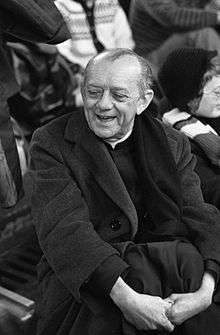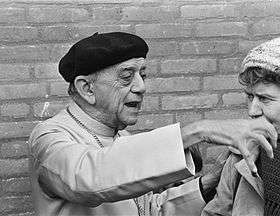Hélder Câmara
| The Most Reverend Hélder Câmara OFS | |
|---|---|
| Archbishop-Emeritus of Olinda e Recife | |
 | |
| See | Olinda e Recife (Emeritus) |
| Installed | 12 March 1964 |
| Term ended | 2 April 1985 |
| Predecessor | Carlos Gouveia Coelho |
| Successor | José Cardoso Sobrinho |
| Orders | |
| Ordination |
20 April 1952 by Jaime de Barros Câmara |
| Personal details | |
| Birth name | Hélder Pessoa Câmara |
| Born |
February 7, 1909 Fortaleza, Brazil |
| Died |
August 27, 1999 (aged 90) Recife, Brazil |
| Nationality | Brazilian |
| Denomination | Roman Catholic |
| Motto | In manus tuas |
| Coat of arms |
 |
Dom Hélder Pessoa Câmara (Portuguese: [dõ ˈɛwdeɾ peˈsoɐ ˈkɐ̃mɐɾɐ]; February 7, 1909 – August 27, 1999) was a Brazilian Roman Catholic Archbishop. He was the Archbishop of Olinda and Recife, serving from 1964 to 1985, during the military regime of the country.
An advocate of liberation theology, he is remembered for his social and political work for the poor and for Human Rights and democracy during the military regime. He also said the aphorism, "When I give food to the poor, they call me a saint. When I ask why they are poor, they call me a communist."[1]
Early life and education
He was born Hélder Pessoa Câmara in Fortaleza, Ceará, in the poor Northeast Region of Brazil. His father was an accountant and his mother a primary school teacher.[2] He went to local Catholic schools and decided to become a priest, completing seminary.
Career

He was ordained a priest in 1931 and appointed auxiliary bishop of Rio de Janeiro in 1952. During his first years as a priest he was a supporter of the far-right organization Brazilian Integralism, an ideological past that he went to reject. In 1959 he was appointed archbishop of Olinda e Recife.[3] During his tenure, Câmara was informally called the 'Bishop of the slums' for his clear position on the side of the urban poor.[4] With other clerics, he encouraged peasants to think beyond their conventionally fatalistic outlook by studying the gospels in small groups and asking what conclusions could be drawn for social change. He was active in the formation of the Brazilian Bishops’ Conference in 1952, and served as its first general secretary until 1964.<ref name = O'Connell/> In 1959 he founded Banco da Providência in Rio de Janeiro, a philanthropic organization to fight poverty and social injustice by making it easier for poor people to receive loans.[5]
He attended all four sessions of the Second Vatican Council and played a significant role in drafting the Pastoral Constitution on The Church in the Modern World.<ref name = O'Connell/> On November 16, 1965, a few days before the Council ended, 40 bishops led by bishop Hélder Câmara met at night in the Catacombs of Domitilla outside Rome. They celebrated the Eucharist and signed a document under the title of the Pact of the Catacombs. In 13 points, they challenged their brother bishops to live lives of evangelical poverty: without honorific titles, without privileges, and without worldly ostentation. They taught that "the collegiality of the bishops finds its supreme evangelical realization in jointly serving the two-thirds of humanity who live in physical, cultural, and moral misery". They called for openness "to all, no matter what their beliefs".[6][7]

Under the guidance of archbishop Hélder Câmara, the Catholic church in Brazil became an outspoken critic of the 1964-85 military dictatorship and a powerful movement for social change.[5] Câmara spoke out and wrote about the implications of using violence to repress rebellion resulting from poverty and injustice in other venues than Brazil. Traditionalist Catholics urged the military government to arrest Câmara for his support of land reform[8] and Câmara's colleague, Father Antônio Henrique Pereira Neto, was murdered by unknown conservative forces.[9][10]
A proponent of liberation theology, he was Archbishop of the Diocese of Olinda and Recife from 1964 to 1985, during a period when the country had a series of military rulers. Liberation theology politicised the church's charitable work and brought criticisms that it was encouraging the armed revolutionary struggles that swept Latin America during the 1970s and 1980s.[5]
He published Spiral of Violence (1971), a short tract written when the United States was immersed in a still escalating Vietnam War. It is distinctive for linking structural injustice (Level 1 violence) with escalating rebellion (Level 2 violence) and repressive reaction (Level 3 violence). In it, Câmara called on the youth of the world to take steps to break the spiral, saying their elders became addicted to those escalating steps. By the early 21st century, this book had been out of print in the United Kingdom for about 20 years. A scanned version in English is available on the web at the link given below.
He died, aged 90, in Recife.
Controversies
Câmara had some controversial views, disagreeing with the Church on his support for divorce, women's ordination and artificial contraception. He criticized Pope Paul VI's Humanae Vitae views on artificial contraception, calling the encyclical "a mistake" meant to "torture spouses, to disturb peace of many homes", "at his own way, a new condemnation of Galileo", "the death of the Council" and "the practical aniquilation of ecumenism".[11]
In his famous interview with Italian journalist Oriana Fallaci, he also stated that, despite his support for non-violence, he didn't oppose violent tactics: "And I respect a lot priests with rifles on their shoulders; I never said that to use weapons against an oppressor is immoral or anti-Christian. But thats not my choice, not my road, not my way to apply the Gospels".[12]
Câmara identified himself as a socialist and not as a marxist, and while disagreeing with marxism, had marxist sympathies. In the Oriana Fallaci interview he stated that "My socialism is special, its a socialism that respects the human person and goes back to the Gospels. My socialism it is justice." He said, concerning Marx, that while he disagreed with his conclusions, he agreed with his analysis of the capitalist society.
Legacy and honors
- In 1973, Câmara was nominated for the Nobel Peace Prize by the American Friends Service Committee (AFSC).[13]
- In 1975, he was awarded the Pacem in Terris Award, initiated by the Catholic Interracial Council of the Diocese of Davenport, Iowa. It was named after a 1963 encyclical letter by Pope John XXIII that calls upon all people of good will to secure peace among all nations. Pacem in terris is Latin for "Peace on Earth".
- In 2015, the Vatican's Congregation for the Causes of the Saints granted its nihil obstat, authorizing the Archbishop of Olinda and Recife to open the beatification and canonization process for Câmara.<ref name = O'Connell>O'Connell, Gerard (April 27, 2015), "Call Him a Saint?", America, retrieved April 18, 2015</ref>[14]
See also
Notes
- ↑ Quote: "Quando dou comida aos pobres chamam-me de santo. Quando pergunto por que eles são pobres chamam-me de comunista." – cited in Zildo Rocha, Helder, O Dom: uma vida que marcou os rumos da Igreja no Brasil (Helder, the Gift: A Life that Marked the Course of the Church in Brazil), Page 53, Editora Vozes, 2000, ISBN 978-85-326-2213-6. – 208 pages (Portuguese)
- ↑ O'Shaughnessy, Hugh. "Helder Câmara – Brazil's archbishop of the poor", The Guardian, October 13, 2009
- ↑ Cheney, David M., "Archbishop Helder Pessoa Câmara", The Hierarchy of the Catholic Church, retrieved April 20, 2015
- ↑ Healy, Barry (July 14, 2009), "'Bishop of the slums' — Dom Hélder Camara and Brazil's church of the poor", Links: International Journal of Socialist Renewal, retrieved April 20, 2015
- 1 2 3 Bellos, Alex. "Helder Camara" (obit), The Guardian, August 31, 1999
- ↑ The Pact of the Catacombs (Domitilla); A poor servant Church (PDF), Rome: SEDOS - Documentation and Research Centre, retrieved April 20, 2015
- ↑ Sobrino, Jon, SJ (March 24, 2010), "The urgent need to return to being the church of the poor", National Catholic Reporter, retrieved April 20, 2015
- ↑ Lernoux, Penny (1989), People of God: The Struggle for World Catholicism, New York: Viking, p. 341, ISBN 0-670-81529-2
- ↑ Browne, Malcolm W. (July 12, 1969), "Church Liberals in Argentina Target of Rightists", New York Times, p. 8
- ↑ "Priest and Civilian Murdered in Brazil", New York Times, May 29, 1969, p. 7
- ↑ Come i progressisti non vinsero al Concilio / Una recensione di Roma, Due del Mattino di Monsignor Hélder Câmara / di Massimo Introvigne, CESNUR Official Website (Italian)
- ↑ Entrevistas históricas: Oriana Fallaci entrevista dom Helder Câmara, Socialista Morena Website (Portuguese)
- ↑ Nobel Peace Prize nominations. American Friends Service Committee
- ↑ Modino, Luis Miguel (April 10, 2015), "The initiation of Dom Helder Camara's path to sainthood now has a date", Iglesia Descalza, retrieved April 18, 2015
References
- Regan, David. C.S.Sp (2002), Why Are They Poor?: Helder Camara in Pastoral Perspective, Theologie und Praxis 13, Münster: Lit, ISBN 3-8258-6151-1
External links
| Wikimedia Commons has media related to Hélder Câmara. |
- Links for Dom Helder Camara
- Text of Câmara's Spiral of Violence, Alastair McIntosh website
- Text of Câmara's 1972 speeches to Mani Tese, University of St. Thomas
- The 1965 "Pact of the catacombs" for a servant and poor church
| ||||||||||||||||||||||||||
| ||||||
|